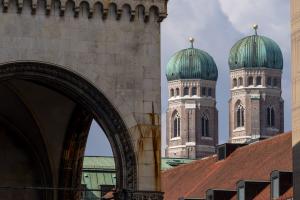 Last week, one of the more long-simmering disputes in contemporary conservative thought flared up pretty dramatically. Sohrab Ahmari—erstwhile Wall Street Journal contributor, current New York Post writer, and prominent conservative Catholic—fired off a sharp polemic in the pages of First Things against a certain strain of conservatism epitomized by National Review writer David French. (French issued a rejoinder shortly thereafter.)
Last week, one of the more long-simmering disputes in contemporary conservative thought flared up pretty dramatically. Sohrab Ahmari—erstwhile Wall Street Journal contributor, current New York Post writer, and prominent conservative Catholic—fired off a sharp polemic in the pages of First Things against a certain strain of conservatism epitomized by National Review writer David French. (French issued a rejoinder shortly thereafter.)
I don’t want to paint over too many nuances, but much of the online chatter surrounding this dust-up has framed the debate as a clash between Ahmari’s hard-nosed “Trumpian” approach to politics—which is less squeamish about the use of state power than traditional Reaganite conservatism—and French’s more conciliatory classical liberalism, which emphasizes pluralism and procedural norms. That’s a fascinating conversation, to be sure, but it tends to downplay the distinctly Christian dimension of the controversy. Religious, not tactical, commitments underpin these two writers’ views.
Without saying so explicitly, Ahmari is plainly gesturing in the direction of Catholic integralism—an approach to politics that calls for establishing the Catholic Church as the moral lodestar of the political state (and one I’ve written about here before). French—an evangelical—rejects that view, favoring instead a conservatism that is less optimistic about the prospects for an ideal political order on earth.
It will come as no surprise to longtime readers that, at least from a theological perspective, I’m squarely in French’s corner. But the clash is worth discussing because it’s reflective of a wider tendency in certain conservative theological circles to declare the project of liberal democracy a failure. Following Patrick Deneen’s argument in Why Liberalism Failed, proponents of this position argue that today’s widespread cultural repudiation of traditional Christian moral teachings, and increased willingness to direct state power against those teachings, is but an outworking of liberalism’s own “inner logic.” Liberalism, which prioritizes individual autonomy as an absolute value to be secured by the government, must inevitably corrode any commitments beyond the individual’s relationship to the state.
Without delving into the book too deeply, I tend to think Deneen’s case against liberalism is a bit of a just-so story. It largely fails to engage the nuances of political theory teased out by scholars like Philip Hamburger or John Marini—such as the emergence in the early 1900s of the “administrative state,” which abandoned traditional ideas of natural law in favor of a positivistic managerial progressivism. Absent the rise of the administrative state (which has a European, not American, philosophical pedigree) it is entirely unclear whether the modern American dystopia Deneen describes—one where the leviathan state perpetually intervenes to emancipate ever-more-alienated individuals—could have come into being. Rather, as the Claremont school of political philosophy has argued (quite persuasively to my mind), from the start the American liberal tradition was deeply rooted in the principle of human equality as a matter of natural law, even if that promise of inequality was imperfectly actualized.
But Deneen’s argument has been widely influential among those of a certain cast of mind. And so, in lieu of a “return to the Founders’ vision,” some propose to turn the clock back further still—returning to a model of “Gelasian dyarchy” where the state and church participate together in the business of governance.
Now, to the extent integralism or some variation is being posited as a live political option in 2019 (and not as an abstruse philosophical ideal), I struggle to see that the view has much merit at all. For one thing, who is the possible constituency for a Catholic political state? Certainly most American Catholics—the overwhelming majority of whom reject the Church’s official teachings on contraception, and many of whom reject the Church’s position on LGBT issues—would not endorse such a project. Conservative Protestants like myself—who agree with Ahmari on 90% or more of moral issues—would never back a political platform under which we would be considered heretics and subject to punishment. And this, of course, is saying nothing of the clerical credibility crisis generated by ongoing sexual-abuse revelations. Additionally, would the Church under Pope Francis even have any desire to serve as America’s established religion? It’s hard to imagine liberal cardinals like Joseph Tobin or Blase Cupich, steeped in the liberal-democratic “spirit of Vatican II,” ever endorsing such a view.
And finally, talk of integralism as a realistic political option seems to require a kind of apocalyptic zero-hour event, one that results in the destruction of civilization as we know it and the emergence of a new and different order. And that would seem to imply that it is the moral duty of the faithful to accelerate that apocalypse—an uncomfortably utilitarian prospect.
In the wake of this whole Ahmari-French exchange, I’ve found myself asking why all this talk of integralism (or quasi-integralism—Ahmari doesn’t come right out and endorse the more hard-edged forms) gets under my skin. Honestly, it’s not really the prospect of state-administered Catholicism that annoys me so much. It’s the constant messaging—whether subtle or overt—that all those Christians who don’t hop aboard the end-of-liberal-democracy train are either moral degenerates or hopeless rubes.
In this way of thinking, few groups come in for more criticism than those dastardly libertarians—those deeply skeptical of the use of coercive state power to order society. A particular noxious example of this tendency shows up at Mere Orthodoxy, where “libertarians” are labeled members of the “anti-Christian Right” along with “a poisonous fringe of grifters, eugenicists, conspiracy theorists, [and] white nationalists.”
Now, I’m certainly no anarcho-capitalist, but I’m at least comfortable with the “libertarian” moniker. And those political principles help inform the particular actions I take in the service of Christ. Love of God explains why I’ve devoted hundreds of hours to religious liberty litigation, which necessarily involves the defense of domains on which the state cannot infringe (and there are countless others—including David French himself—who’ve done far more than me).
As I see it, the great insight of “libertarian” thinking is not what Deneen discusses—an emphasis on absolute and unfettered human autonomy—but the terrible truth of unintended consequences and perverse incentives. Well-intentioned policies can go horribly awry for reasons never foreseen by their designers (Vatican II, anyone?), which should lead to serious hesitation on the parts of policymakers inclined to propose sweeping reforms. Perhaps this is too cynical a view of the human capacity for political order—but it’s not clear to me it’s any more cynical than the notion that human flourishing is impossible under liberal democracy.
But this point—the possibility that libertarian skepticism of state power may stem not from a libertine moral disposition, but from a clear-eyed appreciation of sin’s corruptive effects—seems to be lost on certain Christian critics of liberal democracy. Instead, the critics merely offer contempt for the reality of liberal democracy, and even more contempt for its philosophical defenders. This, in turn, carries with it the implication that those of us working for religious liberty in the real world—those of us working to ensure the integralists have the freedom to make their case—are a kind of sub-Christian fifth column who’re making too many compromises with the liberal state. And that is deeply frustrating. Even more galling is the fact that most of the folks regurgitating these ideas are self-identified “writers” comfortably ensconced in major metropolitan areas—not organizers on the front lines in any meaningful sense. (I realize I’m channeling old left-wing arguments about the tension between theory and practice, but so be it.)
Obviously, there’s much more that could be said on this topic. But at the root of it all, I’m profoundly convinced that this is not a season for alienating allies. To the extent the integralists remind us to view life—and politics—in the light of eternity, I can appreciate what they have to say (and much as I may disagree with them, I have no interest in seeing their views purged from the public square).
I only wish some of them were willing to, once in a while, return the favor. But perhaps that just shows I’ve drunk too much of the pluralist Kool-Aid.












